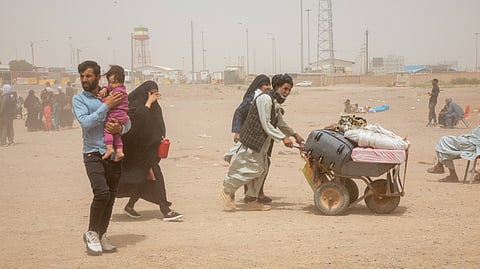Zahra Nader on Iran’s brutal deportations of Afghan refugees: State of Southasia #30
On 15 August 2025, the Taliban marked four years since retaking control of Afghanistan – a period defined by deepening authoritarianism, economic collapse, and international isolation. As the regime tightens its grip, the country faces yet another compounding crisis: mass deportations of Afghan migrants from neighboring Iran and Pakistan.
Since January 2025, more than one million Afghans have been expelled from Iran alone, while Pakistan – once a long-time host of Afghans – began its own deportations in November 2023, contributing to a total of 2.5 million returnees over the past two years. Many of those forced back had lived abroad for decades, built families, and held legal documentation, only to find themselves suddenly unwelcome and pushed into an Afghanistan ill-equipped to receive them.
In this episode of State of Southasia episode, journalist Zahra Nader, editor-in-chief of Zan Times, speaks to Himal’s associate editor Nayantara Narayanan about the rapidly escalating humanitarian emergency. Drawing from months of Zan Times’ field reporting along the Iran-Afghanistan border, Nader recounts harrowing stories of Afghan refugees beaten in detention, robbed of wages and housing deposits, and returned across the border. Camps in Herat and Nimruz provinces, already overcrowded and under-resourced, now shelter hundreds of thousands – many without access to food, water, or medical care. Women and children, who make up over 60 percent of returnees, face further repression under Taliban rule, including travel restrictions, bans on education and total economic exclusion.
Beyond the immediate suffering, Nader highlights how geopolitics and systemic discrimination are driving the deportation campaigns. Pakistan’s expulsions appear aimed at pressuring the Taliban over cross-border militancy. In Iran, structural racism and political scapegoating have intensified in the wake of regional tensions, with state-aligned media accusing Afghan migrants of espionage. Nader says Afghan refugees are being forced from one impossible situation into another, with little international attention and even less support.
Listen to the full episode on Spotify, Apple podcasts and YouTube.
State of Southasia releases a new interview every two weeks.
Episode notes:
Zahra Nader’s recommendations:
And I Still Sing – Fazila Amiri (documentary)
Kabul Carnival: Gender Politics in Postwar Afghanistan – Julie Billaud
Further reading from Himal’s archives:
Iran’s harrowing drive to deport Afghan refugees
The political economy of reporting on the War on Terror in the Afghanistan–Pakistan borderlands
India’s Taliban gambit exposes Pakistan’s Afghanistan strategy
As India and China square up in Afghanistan, the Taliban is set to win
Will Pakistan make a fatal mistake backing the United States against Iran?

